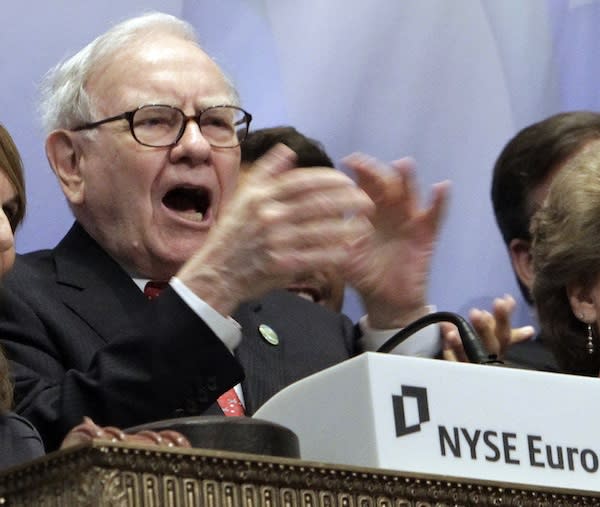 The Lookout
The LookoutWarren Buffett would likely pay no income taxes under Cain’s 9-9-9 plan

If the "9-9-9" tax plan promoted by Herman Cain, a leading Republican presidential candidate, had been the law of the land last year, Warren Buffett would very likely have paid no income taxes, according to an analysis prepared for Yahoo News and The Lookout by the American Institute of Certified Public Accountants. At most, Buffett would have paid taxes on just 1 percent of his income.
Cain, a Georgia businessman, has risen to the top of several polls for the 2012 presidential campaign. A centerpiece of his platform is his 9-9-9 tax plan. Devised by Rich Lowrie, an Ohio wealth manager for Wells Fargo, the plan would scrap the current tax system--including payroll taxes, capital gains taxes and estate taxes--and replace it with a tax code that imposes a 9 percent personal income tax, a 9 percent national sales tax, and a 9 percent corporate income tax.
If the plan is to impose a 9 percent tax, why would Buffett pay only 1 percent--or zero percent? Why so little?
Using information Buffett has released about his total taxable income and his effective tax rate under the current system, Melissa Labant, an accountant with the American Institute of CPAs, said that the bulk of Buffett's taxable income came from capital gains. Cain's 9-9-9 plan would eliminate taxes on capital gains.
According to Labant's rough calculation, Buffett's ordinary income, outside of capital gains, comes to around $4.9 million. At Cain's proposed rate of 9 percent, Buffett would pay around $440,000 in income tax--1.1 percent of the approximately $40 million in taxable income, after deducting for charitable giving and local taxes, Buffett earned last year.
Buffett's returns show he made $62.9 million last year, but his taxable income was around $39.8 million. He has said the roughly $23 million difference is thanks to charitable contributions and local taxes.
"Last year my federal tax bill—the income tax I paid, as well as payroll taxes paid by me and on my behalf—was $6,938,744," Buffett wrote in an op-ed article in the New York Times in August. "That sounds like a lot of money. But what I paid was only 17.4 percent of my taxable income—and that's actually a lower percentage than was paid by any of the other 20 people in our office. Their tax burdens ranged from 33 percent to 41 percent and averaged 36 percent."
A tax rate of 17 percent is significantly higher, of course, than a tax rate of 1 percent. But even a tax rate of 1 percent is likely too high of an estimate, Labant's calculations suggest. Cain's 9-9-9 plan allows individuals to deduct charitable contributions, and Buffett's charitable giving almost certainly exceeded $4.9 million.
If that's the case, as it appears, then Buffett would have paid no income taxes at all last year under the plan, Labant said.
Labant stressed that her calculation required her to make several assumptions, because Buffett hasn't released his full tax returns and because Cain's plan lacks specifics in some areas. Several factors, she said, make it impossible to calculate with certainty the exact portion of Buffett's income that's derived from capital gains, and therefore the exact figure he'd pay under a 9-9-9 tax code. For instance, Buffett may or may not be subject to the alternative minimum tax, and he may or may not have foreign tax credits created by taxes he paid in other countries. We also don't know the exact amount of his charitable giving. Nor do we know whether Cain's plan would exempt all such giving, or make distinctions between different types of contributions, as some tax systems do.
Income taxes aren't the only taxes Buffett would pay under Cain's plan. There's also that 9 percent sales tax. But this, too, would likely hit him less hard than it would hit less affluent Americans. We can't calculate the exact effect of the sales tax on Buffett without knowing how much he spends each year. But as a general rule, shifting the tax system away from income and toward sales shifts more of the burden onto lower-income Americans. The poor spend a larger share of their earnings than do the rich, because they don't have the luxury of having extra money to save. (Also, Buffett is said to live quite modestly.)
So, if Buffett thinks he's getting off easy under the current tax system, he should try life under Cain's plan. Then he'd really be complaining.
